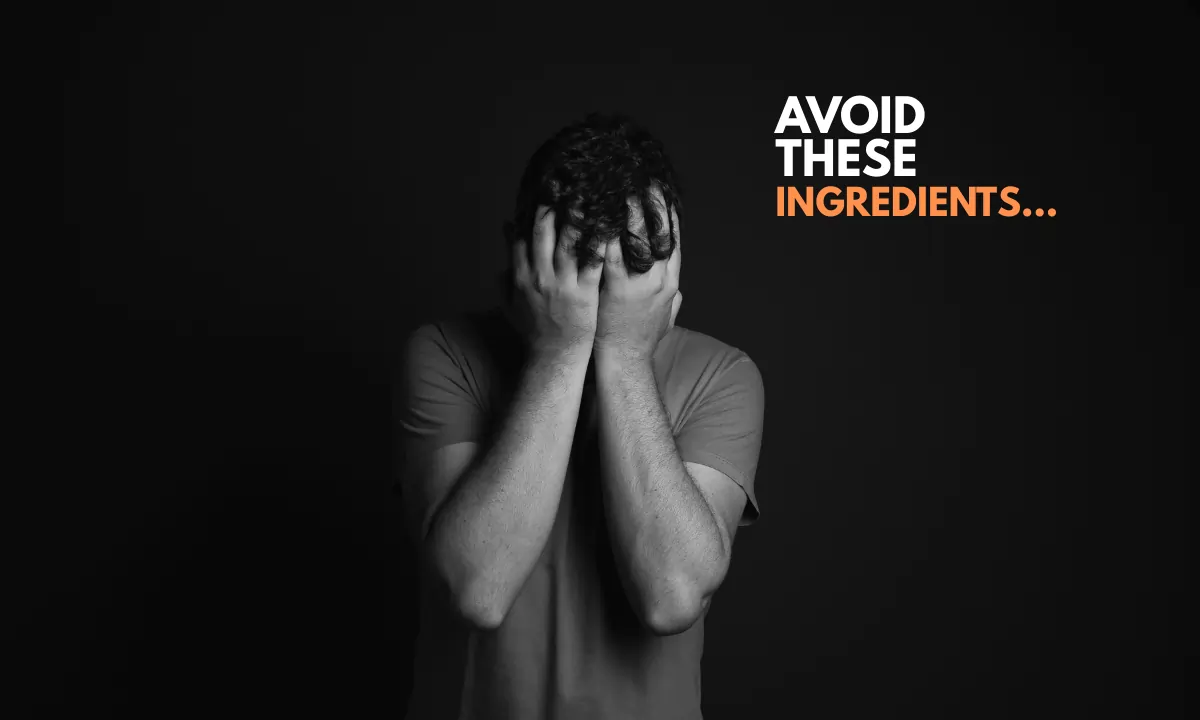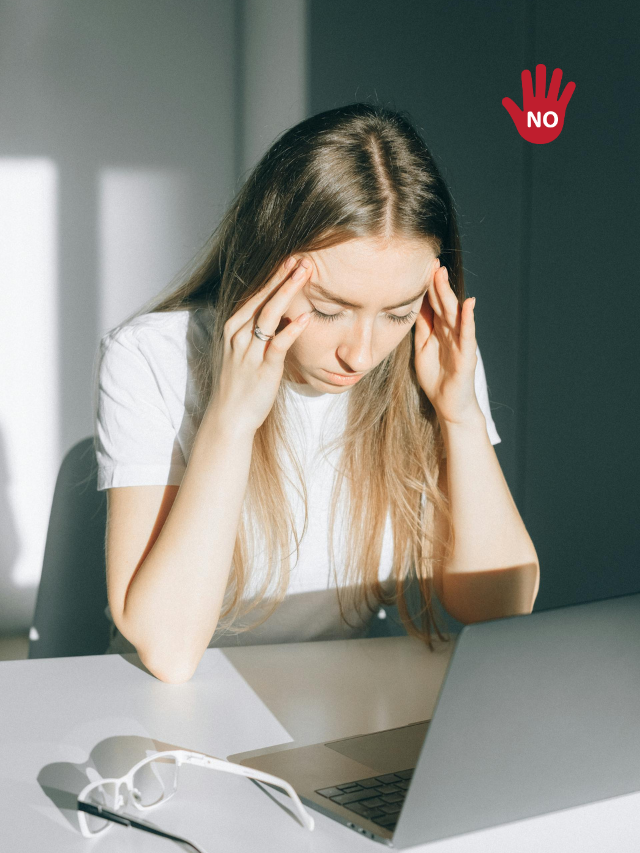Are you a person who regularly consumes certain ingredients, which might give you, chills when feeling stressed or nervous, especially being on a diet? Well, you may feel some sort of relief during that point of time, but it can make you more anxious in the long term. You may be tempted to drink a glass of wine to shoot your body.
What if you get to know that sticking to regular consumption of toxic food or drinks can increase your anxiety levels? Yes, you hear it right. If ingredients like alcohol, sugary foods, soda and processed food are your ongoing options, you should unwind with these food habits for long-term health and safety. These can increase the symptoms for their way of interacting with the brain and body.

Alcohol
Does your brain tickle your mind and consume alcohol to relax or unwind? Most of the people are unaware of its significant role in increasing anxiety levels. Alcohol acts as a central nervous system depressant.
In the initial days of consumption, it produces feelings of relaxation or euphoria, but with time, it becomes disruptive to have a balance of neurotransmitters in the brain. It is especially seen in serotonin and gamma-aminobutyric acid (GABA), which are essential for regulating mood and anxiety.
After the initial effects of alcohol wear off, your body undergoes a period of rebound anxiety as it processes the alcohol out of the system, referred to as anxiety. During this time, you will start feeling anxious or unsettled the day after consuming alcohol. This effect is pronounced in people who are already prone to the disorders. It is due to the disruption in neurotransmitter balance, exacerbating your symptoms.
Alcohol can also lead to dehydration and disrupt your sleep patterns. There are two factors that have been associated with increased symptoms. Dehydration reduces the availability of water for normal body function, including brain activity. This can cause cognitive fogginess and maximize the feeling of unease for you.
Sleep disruption, especially a reduction in REM sleep, impairs your brain’s ability to regulate mood and response responses. This is why you might be more at risk of the symptoms after a night before drinking.
Caffeine
Caffeine is a kind of psychoactive stimulant drug that is found in coffee, tea and many energy drinks. It plays a key role in the symptom-inducing dietary habits. Caffeine works by blocking adenosine, which is a neurotransmitter that promotes relaxation and sleep. In doing so, it can increase alertness and energy, but the consequence is that it can trigger the release of stress hormones, be it cortisol or adrenaline. You may feel useful in helping you to stay awake/ focused. There are high chances to mimic the physical symptoms of the disorder, including a racing heart, restlessness and jitteriness.
If you are sensitive to caffeine or prone to anxiety, even moderate consumption can cause an increase in symptoms. The release of stress hormones can contribute to physical sensations that anxiety experienced people face. The rapid heartbeat and shallow breathing trigger a feedback loop of panic.
Processed foods
Processed foods are those that are changed from their original foo through washing, cutting, pasteurizing, canning and fortifying. Sugary drinks, chips and smoked sausage are some of the food options that fall under this category. The habit of eating these kinds of foods has become a large option of modern diets, but it contributes to the disorder. Firstly, processed foods are stripped of vital nutrients like magnesium, B-group Vitamins and zinc.
All these nutrients are important for mental health. A deficiency in these nutrients can affect your brain’s ability to regulate mood. Processed foods are also high in artificial additives. Preservatives, artificial flavours and colours are major options to make attractive and tasty that motivate you to grab them. But it has consequences interfering with normal brain chemistry.
As per reports, food additives cause rapid fluctuations in your blood sugar and lead to mood swings and increased symptoms. The sugar crash that follows the consumption of processed foods high in sugar and is harmful to you. It can cause irritability, fatigue and the disorder levels.
As a person following a strict diet, fiber is high in need. Processed foods are that they lack fiber and other nutrients that promote gut health. The gut-brain connection has a link between gastrointestinal health with mental health, increasing regular mood and disorder. Diets high in processed foods and low in fiber can create disruption for your gut bacteria.
Soda
Soda, caffeinated and sugary varieties have a double impact on anxiety levels. Much like coffee, caffeinated sodas contain enough caffeine that stimulate the central nervous system and increase heart rate. It may also promote the release of stress hormones from your system. Due to this, it exacerbate the disorder in your being sensitive to caffeine.
Soda is packed with sugar or artificial sweeteners. The high sugar content leads to spikes in blood sugar levels and is followed by inevitable crashes. Fluctuations in blood sugar have a high likelihood of mood swings and irritability. The crash that follows the initial sugar high can leave you feeling fatigued, anxious and also craving for more sugar. Such cravings can make you more prone to consuming soda-based food options.
Sugary foods
Pastries, candy and desserts are sugary foods, and these are major contributors to anxiety. It is because of the impact on blood sugar levels. When you consume foods that are high in sugar, your blood glucose levels spike and give you a burst of energy and mood boost for a temporary time.
However, the challenge is a sharp drop in blood sugar, known as a crash. It can cause fatigue and anxiety. The brain relies on a steady supply of glucose to function in a proper way. When your glucose levels fluctuate, your brain’s ability to regulate mood gets hampered and makes you feel a sense of uneasiness. Daily consumption of sugary foods can also lead to chronic inflammation, which has been linked to mental health disorders – depression and the mentioned disorder.
Diets in dependency on sugar can affect brain health through inflammation that can cause blood sugar imbalances. When you intake high sugar, it can increase the production of inflammatory cytokines, and it has a direct link to mental disorders. Chronic inflation in your brain might get disrupted and stop the normal function of neurotransmitters. So, it can be difficult to regulate emotions and manage anxiety.
The high consumption of sugar-based foods can trigger the release of dopamine. While this might give you a temporary sense of happiness and comfort, but can make you more addictive. Over time, your brain would require more sugar to achieve the same dopamine response, thus worsening the symptoms of anxiety.
| Food/Drink | Harmful Components | Impact on Diet | Impact on Anxiety | Quantity for Anxiety Management |
| Alcohol | Empty calories and dehydration can worsen anxiety | Weight gain, nutrient deficiency | It can initially reduce anxiety but worsen it long-term | Limit to no more than 1 drink per day (if at all) |
| Caffeine | Stimulants can disrupt sleep | It can lead to weight gain, insomnia | It can increase anxiety, especially in sensitive individuals | Moderate consumption (1-2 cups of coffee per day) |
| Soda | High in sugar, artificial sweeteners, and sodium | Contributes to weight gain, dental problems, and high blood pressure | Can worsen anxiety due to sugar fluctuations | Avoid or limit to occasional consumption |
| Processed Foods | High in unhealthy fats, sodium, and preservatives | Contributes to weight gain, heart disease, and other health problems | Can worsen anxiety due to nutrient deficiencies | Minimise consumption, opt for whole, unprocessed foods |
| Sugary Foods | High in empty calories, can contribute to insulin resistance | Contributes to weight gain, diabetes, and heart disease | Can worsen anxiety due to sugar fluctuations | Limit to occasional consumption. Choose natural sweeteners like honey or maple syrup in moderation. |
FAQ
How does alcohol impact anxiety?
Alcohol initially provides a sense of relaxation but can worsen anxiety in the long term by disrupting neurotransmitter balance, particularly serotonin and GABA. This can lead to a rebound effect, increasing anxiety after the effects wear off.
Can caffeine really make anxiety worse?
Yes, caffeine stimulates the release of stress hormones like cortisol and adrenaline, which can mimic anxiety symptoms such as a racing heart and restlessness. Even moderate consumption can exacerbate anxiety in sensitive individuals.
Why are processed foods bad for mental health?
Processed foods are often stripped of essential nutrients like magnesium and B vitamins, which are important for brain function. Additionally, additives and preservatives can interfere with normal brain chemistry, leading to mood swings and increased anxiety.
Does soda affect anxiety levels?
Soda, especially caffeinated and sugary varieties, can spike blood sugar levels, leading to crashes that cause mood swings and heightened anxiety. Caffeine in soda can also increase heart rate and trigger the release of stress hormones.
What is the connection between sugary foods and anxiety?
Sugary foods cause blood sugar spikes followed by crashes, which can result in irritability, fatigue, and heightened anxiety. Over time, sugar consumption can lead to chronic inflammation, which is linked to mental health disorders like depression and anxiety.
How do nutrient deficiencies contribute to anxiety?
Lack of essential nutrients like magnesium, zinc, and B vitamins, often found in processed foods, can hinder the brain’s ability to regulate mood. This nutrient deficiency can exacerbate symptoms of anxiety and overall mental health.
Can sugar addiction increase anxiety?
Yes, high sugar consumption can trigger dopamine release, which gives a temporary sense of happiness but increases cravings. Over time, the brain requires more sugar to achieve the same response, worsening anxiety.
Does alcohol consumption affect sleep and anxiety?
Alcohol disrupts sleep patterns, especially REM sleep, which impairs the brain’s ability to regulate mood. Poor sleep combined with dehydration from alcohol can lead to cognitive fogginess and increased anxiety the next day.
Are there healthier alternatives to sugary foods to reduce anxiety?
Natural sweeteners like honey or maple syrup in moderation are better alternatives to highly processed sugary foods, which can cause blood sugar imbalances and mood swings that worsen anxiety.
How can I reduce anxiety through diet?
Minimizing or eliminating processed foods, sugary drinks, and caffeine, while opting for whole foods rich in nutrients like magnesium and B vitamins, can improve brain function and reduce anxiety levels.



